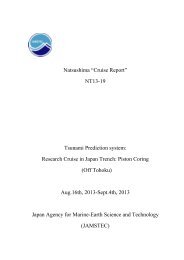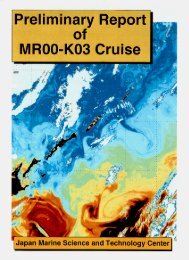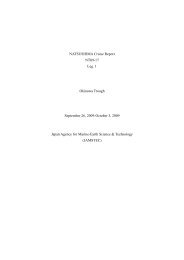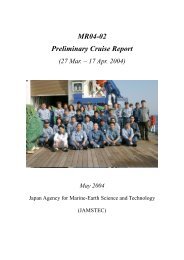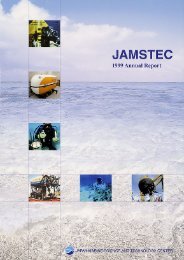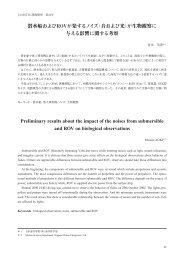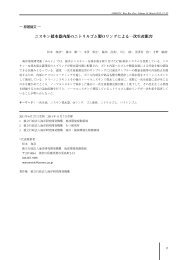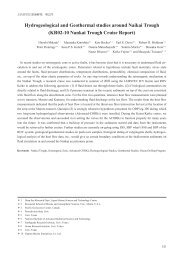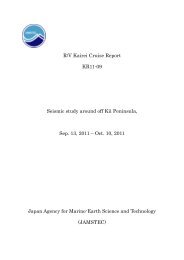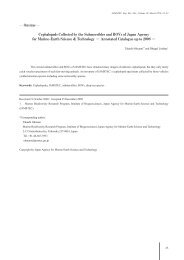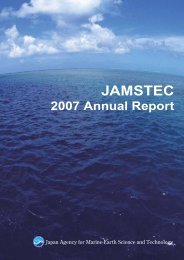Marine Ecosystems Research Department - jamstec japan agency ...
Marine Ecosystems Research Department - jamstec japan agency ...
Marine Ecosystems Research Department - jamstec japan agency ...
You also want an ePaper? Increase the reach of your titles
YUMPU automatically turns print PDFs into web optimized ePapers that Google loves.
JAMSTEC 2002 Annual Report<br />
Frontier Observational <strong>Research</strong> System for Global Change<br />
balance in Western Tibet.<br />
(iii) Initiation of water/heat balance and drainage<br />
study in North Central Mongolia.<br />
(iv) Further data accumulation of the solid precipitation<br />
evaluation and the role of drifting/blowing<br />
on surface water/heat exchange at Barrow.<br />
In , we emphasized initiation at the Mongolian<br />
observation site (iii), and (ii) was downscaled due to<br />
decrease of the budget. Data accumulation at the discontinuous<br />
permafrost zone (iii) will make it possible<br />
to do the comparative study on the characteristics of<br />
land hydrological cycle at the discontinuous and continuous<br />
permafrost zone. Enough data accumulation<br />
for (iv) has been made, and the primary result can be<br />
deduced from the three-year observation. In this study<br />
snow particle counter is playing an important role. The<br />
group is participating in the CREST project related to<br />
water cycle and vegetation, and this aspect will be<br />
studied in detail under that project.<br />
During the past three years, the observation network<br />
has been established and the preparation has been<br />
basically finished for the data collection for implementing<br />
objective (a) – (c). Therefore, the main part of<br />
the activities will be shifted to data accumulation,<br />
analysis, modeling, and integration.<br />
(III) Cloud and Precipitation Processes Group<br />
In order to clarify the hydrological cycle in heat<br />
source regions of the Asia and the maritime continent,<br />
especially the atmospheric hydrological cycle processes<br />
in the regions from the western tropical pacific to the<br />
Baiu front, this group is carrying out multi-scale observations<br />
on hydrological cycle processes of cloud clusters<br />
and elucidating roles of mesoscale cloud and precipitation<br />
systems in each process of atmospheric hydrological<br />
cycles. The results of the observations and analyses<br />
will contribute to the development and improvement<br />
of numerical models of global atmosphere.<br />
This group is conducting observation of the structure<br />
and evolution of cloud and precipitation systems in the<br />
downstream region of the Yangtze River. It is also collaborating<br />
closely with the Air-Sea Interaction Group<br />
of Climate Variations Observational <strong>Research</strong> Program<br />
of FORSGC on the observation of cloud and precipitation<br />
processes in the western tropical Pacific region.<br />
The first intensified observation in the downstream<br />
region of the Yangtze River was performed in FY<br />
and data collected during this year have been analyzed<br />
in detail. The preliminary results on the formation and<br />
development processes of precipitation systems along<br />
the Baiu front were presented in the China-Japan<br />
Workshop on Heavy Rainfall Experiment and Study<br />
(Fig.).<br />
In FY, the second intensified observation in the<br />
downstream region of the Yangtze River was carried out<br />
using Doppler radars, a bistatic receiver, a wind profiler,<br />
automatic weather stations (AWS), and a micro rain<br />
radar (Fig.). After the completion of the observation,<br />
all the observation equipment from Japan has been<br />
Fig.14 A commemorative photograph of the China-Japan<br />
Workshop on Heavy Rainfall Experiment and Study held in<br />
Haikou, China.<br />
Fig. 15 A commemorative photograph of the intensified observation<br />
held in 2002.<br />
166



